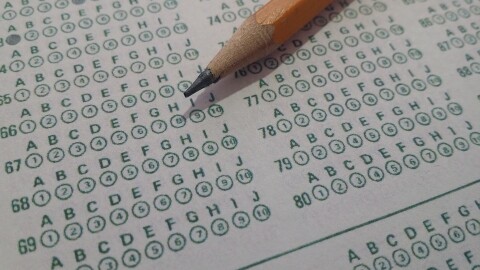At Bexley High School, the third-best high school in Ohio according to U.S. News & World Report, most juniors were planning to take a college entrance exam if they hadn't already. But for the first time in Ohio, school districts will be required to administer the ACT or SAT test to all students, college bound or not.
Will Hoyer was excited to hear that next month, he gets to take the ACT - the nation's most popular college entrance exam - for free. For him, it's a lot more convenient.
“I was pretty happy thinking about having an extra opportunity without having to worry about one, it being on a Saturday, and two, just going out of your way to sign up for it,” Hoyer says.
Hoyer has already taken the exam twice, and his best score was a 32 out of 36. That's a better score than 95 percent of test-takers earned last year, according to the ACT’s website.
Still, Hoyer is happy to sit down for the three-hour exam again.
“A couple more points could really give me a very good score that could get me into some colleges like for sure that I'm looking into,” Hoyer says.
Widening the College Pipeline
Alesia Gillison shares Hoyer's high spirits. The chief academic officer at Columbus City Schools, Gillison helps develop and administer the district’s instructional plan. Columbus boasts Ohio's biggest school district, with more than 50,000 students.
“I don't see any cons," Gillison says. "I look at this as an opportunity for our young people. It's an opportunity for our district to really see how we're preparing our young people.”
It’s a perk for students who would normally pay $42.50 to take the ACT, or $45 to take the SAT. Gillison thinks the new state mandate will open the door for students who weren't thinking about college to consider applying.
“When you think, 'We're about 89 percent economically disadvantaged, and my parents couldn't afford for me to take the test, but I really wanna go to college, and I take the test and I score really high,' can you imagine what that does for a family and for that young person?”
Cailin Papszycki, the regional director of Kaplan's SAT and ACT programs, says there’s been a significant increase in the number of Ohio students signing up for preparation courses, though she won't disclose how much. Kaplan will host a free “ACT Prepathon” to help students prepare, and local Ohio schools have been hosting ACT boot camps throughout the district as well.
Throwing Away Money?
The plan isn't necessarily passing with flying colors, though.
Gillison worries the state could use test results to compare districts to one another without considering other factors affecting district performance.
“When you think about our population, we have over 7,700 ESL (English as a Second Language) students who will be taking the ACT as well, whereas we may have neighboring districts that don't have those numbers,” Gillison says.
In the neighboring Grandview Heights district, high school math teacher Kevin Richards is also concerned, but for different reasons. He wonders why the state is paying $5.25 million dollars for students to take the test once.
“Being a state taxpayer, I think it's a waste of money because you're giving it to tens of thousands of kids who are never going to use the score, who don't need to be taking the test,” Richards says.
According to the National Center for Education Statistics, 68 percent of high school graduates in 2014 immediately enrolled into two- or four-year colleges.
Richards says the law is also potentially holding back some of his more advanced students. They’re backtracking in material in order to maximize their chances of performing well on the ACT.
“We have kids that took Honors Algebra II when they were freshmen. They're taking AP Calculus," Richards says. "Now they have to go back to go through the curriculum of Algebra II."
Another Route to Graduation
For less advanced students, though, an ACT or SAT exam could provide another route to a diploma.
School officials around the state are concerned that 30 percent of this year's juniors may not graduate next year because of tougher standards for Ohio Graduations Tests, also known as the OGT.
If students earn a “remediation-free score” on the ACT or SAT, that can make up for a lower OGT score and they might still graduate.
For the ACT, that means at least an 18 on the English portion, 22 in mathematics and 21 in reading. For the SAT, that means at least 520 in mathematics, 430 in writing or 450 in reading.
Gillison says the ACT also helps students know where they stand academically.
“It's almost like when you take a pretest and you get your score,” Gillison says. “As a student you know, 'Oh okay, I need to study more, I need to do this more.'”
According to the state Department of Education, about 95 percent of schools are administering the ACT over the SAT this spring. It may be the first time some juniors ever consider the test.
For others, like Bexley High School junior Max Meyer, it may just be another attempt at getting the highest score possible.
“After that I'll see where I am, and possibly take it again,” Meyer says.






